
overcome with remorse.
The children, whispering excitedly,
crowded through the door.
For a definition of participles see
PARTICIPLES.
(vii) Commas mark off some adjectival
clauses. Don’t worry too much about
the grammatical terminology here.
You’ll be able to decide whether you
need to mark them off in your own
work by matching them against these
examples.
Can you see the difference in
meaning that a pair of commas makes
here? Read the two sentences aloud,
pausing where the commas indicate
that you should pause in the first
sentence, and the two different
meanings should become clear:
The firemen, who wore protective
clothing, were uninjured. (= nobody
injured)
The firemen who wore protective
clothing were uninjured. (but those
who didn’t wear it...)
(viii)
Commas are used to mark a pause at
asuitablepointinalongsentence.
This will be very much a question of
style. Read your own work carefully
and decide exactly how you want it
to be read.
(ix) Commas are sometimes needed to
clarify meaning. In the examples
below, be aware how the reader
could make an inappropriate
connection:
She reversed the car into the main
road and my brother waved goodbye.
COMMAS
44

She reversed the car into the main
road and my brother??
She reversed the car into the main
road, and my brother waved goodbye.
In the skies above the stars glittered
palely.
In the skies above the stars??
In the skies above, the stars glittered
palely.
Notice how the comma can
sometimes be essential with ‘and’ in a
list:
We shopped at Moores, Browns,
Supervalu, Marks and Spencer and
Leonards.
Is the fourth shop called Marks, or
Marks and Spencer?
Is the fifth shop called Leonards, or
Spencer and Leonards?
A comma makes all clear:
We shopped at Moores, Browns,
Supervalu, Marks and Spencer, and
Leonards.
commemorate (not -m-)
comming Wrong spelling. See COMING.
commission (not -m-)
commit committed, committing, commitment
See ADDING ENDINGS (iv).
committee
common nouns See NOUNS.
comparative comparatively (not compari-)
comparative and (i) Use the comparative form of
superlative adjectives and adverbs when
comparing two:
COMPARATIVE AND SUPERLATIVE
45

John is TALLER than Tom.
John works MORE ENERGETICALLY
than Tom.
Use the superlative form when
comparing three or more:
John is the TALLEST of all the
engineers.
John works THE MOST
ENERGETICALLY of all the
engineers.
(ii) There are two ways of forming the
comparative and superlative of
adjectives:
(a) Add -er and -est to short adjectives:
tall taller tallest
happy happier happiest
(b) Use more and most with longer
adjectives:
dangerous more dangerous most dangerous
successful more successful most successful
The comparative and superlative
forms of adverbs are formed in
exactly the same way:
(c) Short adverbs add -er and -est.
You run FASTER than I do.
He runs the FASTEST of us all.
(d) Use more and most with longer
adverbs.
Nikki works MORE
CONSCIENTIOUSLY than Sarah.
Niamh works THE MOST
CONSCIENTIOUSLY of them all.
(iii) There are three irregular adjectives:
good better best
bad worse worst
COMPARATIVE AND SUPERLATIVE
46

many more most
There are four irregular adverbs:
well better best
badly worse worst
much more most
little less least
(iv) A very common error is to mix the two
methods of forming the comparative and
the superlative:
more simpler simpler
more easiest easiest
(v) Another pitfall is to try to form the
comparative and superlative of
absolute words like perfect, unique,
excellent, complete, ideal. Something
is either perfect or it isn’t. It can’t be
more perfect or less perfect, most
perfect or least perfect.
compare to/ Both constructions are acceptable but
compare with many people still prefer to use ‘compare
with’.
comparitive Wrong spelling. See COMPARATIVE.
competition competitive, competitively.
compleatly Wrong spelling. See COMPLETELY.
complement or COMPLEMENT = that which completes
compliment? Half the ship’s COMPLEMENT were
recruited in Norway.
To COMPLEMENT =togowellwith
something
Her outfit was COMPLEMENTED by well-
chosen accessories.
COMPLIMENT = praise, flattering
remarks
To COMPLIMENT =topraise.
complementary or Use COMPLEMENTARY in the sense of
complimentary? completing a whole:
COMPLEMENTARY OR COMPLIMENTARY?
47

COMPLEMENTARY medicine
COMPLEMENTARY jobs
Use COMPLIMENTARY in two senses:
(a) flattering
(b) free of charge
COMPLIMENTARY remarks
COMPLIMENTARY tickets
completely complete + ly (not completly, completley
or compleatly)
See ADDING ENDINGS (ii).
complex Both words mean ‘made up of many
or complicated? different intricate and confusing aspects’.
However, use COMPLEX when you mean
‘intricate’, and COMPLICATED when you
mean ‘difficult to understand’.
compliment See COMPLEMENT OR COMPLIMENT?.
compose/comprise The report IS COMPOSED OF ten
sections. (= is made up of)
The report COMPRISES ten sections. (=
contains)
Never use the construction ‘is comprised
of’. It is always incorrect grammatically.
comprise (not -ize)
compromise (not -ize)
computer (not -or)
concede
conceive conceived, conceiving, conceivable
See EI/IE SPELLING RULE.
concise
confer conferred, conferring, conference
See ADDING ENDINGS (iv).
confidant, confidante ACONFIDANT (male or female) or a
or confident? CONFIDANTE (female only) is someone
COMPLETELY
48

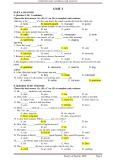
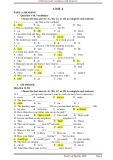
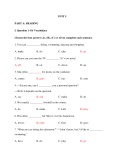
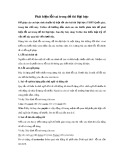
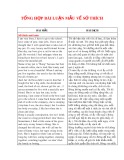
![Bộ tài liệu học vỡ lòng Tiếng Anh [mới nhất]](https://cdn.tailieu.vn/images/document/thumbnail/2020/20200504/lanxichen/135x160/1651588587086.jpg)
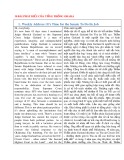
![Đề cương Tiếng Anh phổ thông [năm học]: Tổng hợp đầy đủ nhất](https://cdn.tailieu.vn/images/document/thumbnail/2019/20190717/thukhuyen1257/135x160/7691563342337.jpg)
![10 modals là gì? [Năm hiện tại]](https://cdn.tailieu.vn/images/document/thumbnail/2018/20181029/hongduc7981/135x160/3551540823056.jpg)
![Tài liệu Ôn tập tiếng Anh [chuẩn nhất/mới nhất]](https://cdn.tailieu.vn/images/document/thumbnail/2018/20181013/soandethi/135x160/9551539429153.jpg)



![Từ vựng tiếng Anh về thức ăn và giảm cân [mới nhất, đầy đủ]](https://cdn.tailieu.vn/images/document/thumbnail/2025/20251217/nglinh.diamond@gmail.com/135x160/53091766028543.jpg)

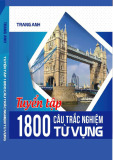
![Tài liệu Từ vựng tiếng Anh Trung cấp [mới nhất]](https://cdn.tailieu.vn/images/document/thumbnail/2025/20250913/nguyentuan250421@gmail.com/135x160/99491757910839.jpg)
![Tài liệu Từ vựng Tiếng Anh theo chủ đề [mới nhất]](https://cdn.tailieu.vn/images/document/thumbnail/2025/20250913/namdhuet@gmail.com/135x160/83251757753810.jpg)



![Tài liệu Từ vựng tiếng Anh cho bé [chuẩn nhất/mới nhất]](https://cdn.tailieu.vn/images/document/thumbnail/2025/20250731/huadaithesang2509@gmail.com/135x160/18631754013896.jpg)



